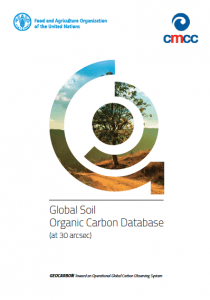Global Soil Organic Carbon Database
Published by the Food and Agriculture Organization of the United Nations and the Euro-Mediterranean Center on Climate Change Foundation.
ISBN: 978-92-5-109762-5
Year of publication: 2017
Abstract:
The most of the global organic carbon is stored in the forest soil. The large quantity of CO2 emitted from soil is a consequence of land use change, both through human activities (e.g. agriculture) or natural hazards (e.g. flooding, landslides, erosion). A net carbon loss from soils adds to the increase in the atmospheric CO2 concentration, probably leading to higher global temperatures. On the other hand, a net soil CO2 sequestration could help to mitigate the greenhouse effect and to improve soil quality. In this purpose, identifying areas suitable for projects aimed to reduce emissions through SOC sequestration, is of the most importance for both developed and developing countries. This report describes the sources and procedures used to develop a global database for SOC content. The FAO approaches and methodologies provided by using Geographic Information Systems (GIS) software, play a crucial role in this process.
Acknowledgements
This document was the results of the collaborative effort of FAO Natural Land Resources Division (NRL), the University of Tuscia and the CMCC Foundation (Euro-Mediterranean Center on Climate Change) in the frame of their respective organizational and institutional activities for research and/or provision of soil information, including mapping of soil resources, in support to sustainable development.
The team, led from John Latham (FAONRL), has involved also: Freddy Nachergaele (FAO) and Matieu Henry (FAO), Rodrigo Vargas (Univ. of Delaware), Sergio Noce (CMCC), Monia Santini (CMCC), Antonio Bombelli (CMCC) and Tommaso Chiti (University of Tuscia).
This work was financially supported jointly by FAO and the European Commission, through the FP7 Project GEOCARBON.
CMCC InstitutesCMCC Divisions


